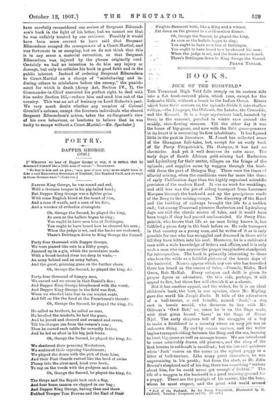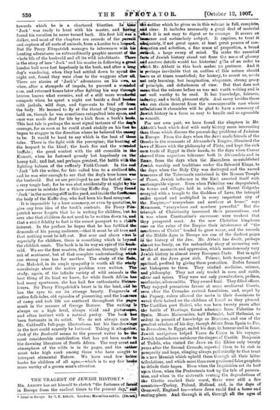BOOKS.
JOCK OF THE BUSHVELD.*
THE Transvaal High Veld falls steeply on its eastern side into 41. flat bush-covered plain, which runs, except for the Laionbo Hills, without a break to the Indian Ocean. Rivers vikieh have their sources on the uplands divide it into shallow valleys,—the Limpopo, the Olifants, the Letaba, the Crocodile, and the Komati. It is a huge mysterious land, haunted by feves,1 in the summer, parched in winter save around the muddy, slow-flowing streams. Till the other day it was the home of big-game, and now with the Sabi game-preserve in ita,heart it is recovering its first inhabitants. It has figured little in the past in literature. M. Junod has collected some of the Sbangaan folk-tales, but, except for an early book of Sir Percy Fitzpatrick's, The Outspan, it has had no chronicler. And yet it well deserves its rates sacer. The early days of South African gold-mining had Barberton and Iiydenburg for their centre, villages on the fringe of the uplands ; and supplies came by waggon through the bush- veld from the port of Delagoa Bay. These were the times of alluvial mining, when the conditions were far more like those of early Californian days than the highly organised scientific precision of the modern Rand. It was no work for weaklings, and still less was the job of riding transport from Lourenco Marques through the bushveld and up the precipitous roads of the Berg to the mining-camps. The discovery of the Rand and .the building of railways brought the life to a sudden end ; but among Transvaal pioneers Barberton and Lydenbnrg days are still the classic source of tales, and it would have been tragic if they had passed uuchronicled. Sir Percy Fitz- patrick, who knows that life as no man living knows it, has fulfilled a pious duty in the book before us. He rode transport. in that country as a young man, and he writes of it as is only possible for one who has struggled and dreamed in those wilds tiltthey have bitten into his soul. Moreover, he is a cultivated man with a wide knowledge of letters and affairs, and it is only such a man who can acquire the proper imaginative standpoint for retrospection. The book is primarily interesting to those wholove the wilds as a faithful picture of the heroic days of the bushveld. Names appear which any one who has travelled there has heard as the centre of tales,—Francis, Blake, Mad Owen, Bob McNab. Every ontspan and drift is given its proper figure or adventure. On this side, perhaps, it will appeal to few, but these few will cherish it as a classic.
But it has another appeal, and the widest, for it is an ideal children's book, the best, in our opinion, since Mr. Kipling gave the world his Jungle Books. It tells of the adventures of a ball-terrier, a red brindle, named ' Jock,'—a dog cast iu heroic mould, who deserves to live with Mr. 011ivanes ' Owd Bob,' or, since he is on the Saga scale, with ,that great hound Samr ' in the Saga of Burnt Njal. The early chapters tell of the struggles of a boy to make a livelihood in a country where an easy job was an unknown thing. By and by comes success, and the writer begins transport-riding between the Berg and the sea, learning to hunt big-game as well as manage teams. We are introduced to some admirably drawn old pioneers, and the story of the first lessons in veldcraft is excellent ; but the interest quickens when ' Jock' comes on the scene as the ugliest puppy in a litter of bull-terriers. Like many great characters, he was
unpromising in his youth ; but from the start, as Dr. John Brown's shepherd said of his dog, there was something " serioul about bim, for he could never get enough o' fechtin'." The life of a waggon in the bushveld is a good training-ground for a puppy. There are the proteges of his master, like the hens, whom he must respect, and the great wild world around
• Jock of the Bushewld. By Sir Percy Fitzpatrick. Illustrated by E. Caldwell. London Longman and Co. [tie. net.)
• le towards which he is a chartered libertine: In blame
`Jock' was ready to hunt with his master, and hieing, found his vocation be never turned back. His first kill was 'a duiker, and most of the chapters are records of the pursuit. and capture of all sorts of animals, from a koodoo to a leopard,; But Sir Percy Fitzpatrick manages to interweave with hi hunting adventures an extraordinarily graphic account of the whole life of the bushveld and all its wild inhabitants. There is the story of how `Jock' and his master in following a great koodoo bull were lost hopelessly in the bush, and after a beg day's wandering, when they had settled down to spend Wt. night out, found they were close to the waggons after There are stories of Jock's' adventures on his own, as when, after a stampede of impala, he pursued a wounded ram, and returned hours later after fighting his way through heaven knows what enemies, and of a still more wonderful escapade when he spent a night out beside a dead koettoo with jackals, wild dogs, and tiger-cats to fend off from the body. He learned to fly at the throat of big-game and hold on, though he was sometimes catapulted into space, and once was made deaf for life by a kick from a buck's heels. This last tale is perhaps the most signal instance of the degh courage, for as soon as be could stand shakily on his feet he began to stagger in the direction where he believed the enemy to be. It would be bard to say which is the best of theta, tales. There is the fight with the porcupine; the hunting of the leopard in the kloof ; the bush fire and the wounded buffalo ; the great contest with the old crocodile in the Komati, when he fastened gamely but hopelessly on thd. horny tail; and last, and perhaps greatest, the battle with the fighting baboon of the ruffianly Field-Cornet. In the end `Jock' left the writer, for fate called him to a civilised life, and he was wise enough to see that the dog's true home wee the bushveld. But we are privileged to see the last of Lite,— a very tragic last; for he was shot accidentally at night by his new owner in mistake for a thieving Kaffir dog. They found Jock' in the morning stiff in the yard, and inside the foinikolise the body of the Kaffir dog, who had been his final conquest.
It is impossible by a bare summary, or even by quotation, to give any true idea of the book's contents. Sir Percy •Fits- patrick never forgets that he is writing for children, but he sees also that children do not need to be written down to, and that a strict fidelity to fact is the surest passport to a chiddh interest. In the preface• he hopes that be has fulfilled' the demands of his young audience,—that it must be all true and that nothing must be left out. But over and above whit is especially for children, there is something which is beyond the childish reach. The book is in its way an epic of the Bush- veld. We see the first masters, the natives, through the eyes not of sentiment, but of that complete understanding. :think one strong man has for another. The study of tie Zulu. Jim Makokel, in its ample sympathy is worth all the windy moralisiugs about the native problem ever written. The study, again, of the infinite variety of wild animals is the best thing of its kind we know, for while South Afriee has had many sportsmen, she has hid few enthusiastic Nature- lovers.. Sir Percy Fitzpatrick's heart is in the land, and he has the eyes to see its strange _ beauty. Fragments of native folk-tales, old episodes- of pioneering, and the William of camp and trek life are scattered threughout the pages much in the manner of George Borrow. The writing to always on a high level, always vivid and Pictureeque, and often instinct with a natural poetry. The book has been fortunate in its artist. We do not always care for Mr. Caldwell's full-page illustrations, but his line-drawingn in the text could scarcely be bettered. Taking it altogether, Jock of the Bushveld seems to the present writer to be the most considerable contribution that has yet been made- to the dawning literature of South Africa. The very scent and atmosphere of the wilds is in its pages, and the anther must take high rank among those who have sought. to interpret elemental Nature. We have read few better. books for children of all ages,—which is to say few' bean
more worthy of a grown man's attention. .











































 Previous page
Previous page